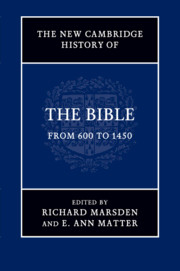Book contents
- Frontmatter
- Contents
- Figures
- Contributors
- Preface
- Abbreviations
- Abbreviations of books of the Bible
- Table of Psalm numbering
- Introduction
- Part I Texts and Versions
- Part II Format and Transmission
- 17 The Bibles of the Christian East
- 18 Carolingian Bibles
- 19 The Latin gospelbook, c. 600–1200
- 20 The Glossed Bible
- 21 The thirteenth century and the Paris Bible
- 22 Romanesque display Bibles
- 23 Latin and vernacular Apocalypses
- 24 The Latin psalter
- 25 Illustration in biblical manuscripts
- Part III The Bible Interpreted
- Part IV The Bible in Use
- Part V The Bible Transformed
- Bibliography
- Index of biblical manuscripts
- Index of scriptural sources
- General index
- References
24 - The Latin psalter
from Part II - Format and Transmission
Published online by Cambridge University Press: 28 May 2012
- Frontmatter
- Contents
- Figures
- Contributors
- Preface
- Abbreviations
- Abbreviations of books of the Bible
- Table of Psalm numbering
- Introduction
- Part I Texts and Versions
- Part II Format and Transmission
- 17 The Bibles of the Christian East
- 18 Carolingian Bibles
- 19 The Latin gospelbook, c. 600–1200
- 20 The Glossed Bible
- 21 The thirteenth century and the Paris Bible
- 22 Romanesque display Bibles
- 23 Latin and vernacular Apocalypses
- 24 The Latin psalter
- 25 Illustration in biblical manuscripts
- Part III The Bible Interpreted
- Part IV The Bible in Use
- Part V The Bible Transformed
- Bibliography
- Index of biblical manuscripts
- Index of scriptural sources
- General index
- References
Summary
The psalter contains the complete book of Psalms, comprising 150 poems originally composed in Hebrew between the tenth and third centuries bce. For monastics, secular scholars and the laity alike, this was arguably the single most important book of the Bible. Among Christians of medieval Europe, it was generally agreed that the psalms were immediately and obviously about Christ: Aquinas summed up a millennium of exegetical opinion when he held that the psalms comprised ‘all theology’ and ‘everything concerning the Incarnation’. The psalter was at the core of both monastic and secular liturgy. For monks, it was the foundation of prayer and the sovereign guide to contemplation; for church writers, it was the cardinal text for trying out new approaches and teaching new ideas; for preachers, it was an inexhaustible handbook for constructing sermons. Clergy and laity knew the psalter better than any other book; and they knew it as a book – that is, not only orally, through sermons and liturgy, but in written form, for they owned it, commissioned it, even learned to read from it. The language of the Latin psalter was the language of the Middle Ages, its phrases so well known that they echo throughout sacred and profane literature of the time, and enrich the vocabulary not only of medieval Latin but of Romance languages. Its verbal images form a significant part of the artistic heritage of medieval Europe.
Text and versions
Though the history of the text of the Latin Bible is covered elsewhere in this volume, two points can usefully be emphasised here. The first is that the book of Psalms presents an exception to the gradual but ultimately overwhelming acceptance across Europe of Jerome's translation of the canonical Old Testament according to the Hebrew text. Instead of his final ‘Hebrew’ version of Psalms, his earlier ‘Gallican’ translation prevailed. The second point is that the text of this Gallican psalter was itself not entirely stable in the Middle Ages, largely due to its very importance in the liturgy and lives of western Christians. Both of these points need some explanation.
- Type
- Chapter
- Information
- The New Cambridge History of the Bible , pp. 427 - 445Publisher: Cambridge University PressPrint publication year: 2012
References
- 1
- Cited by



